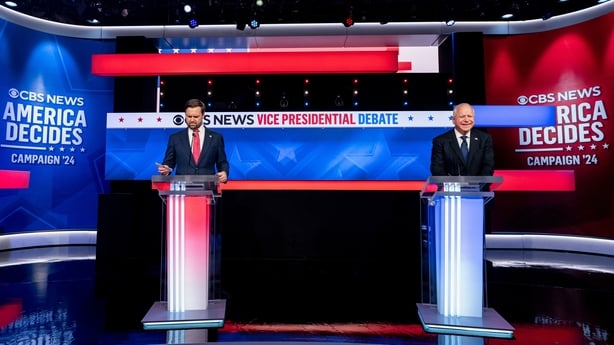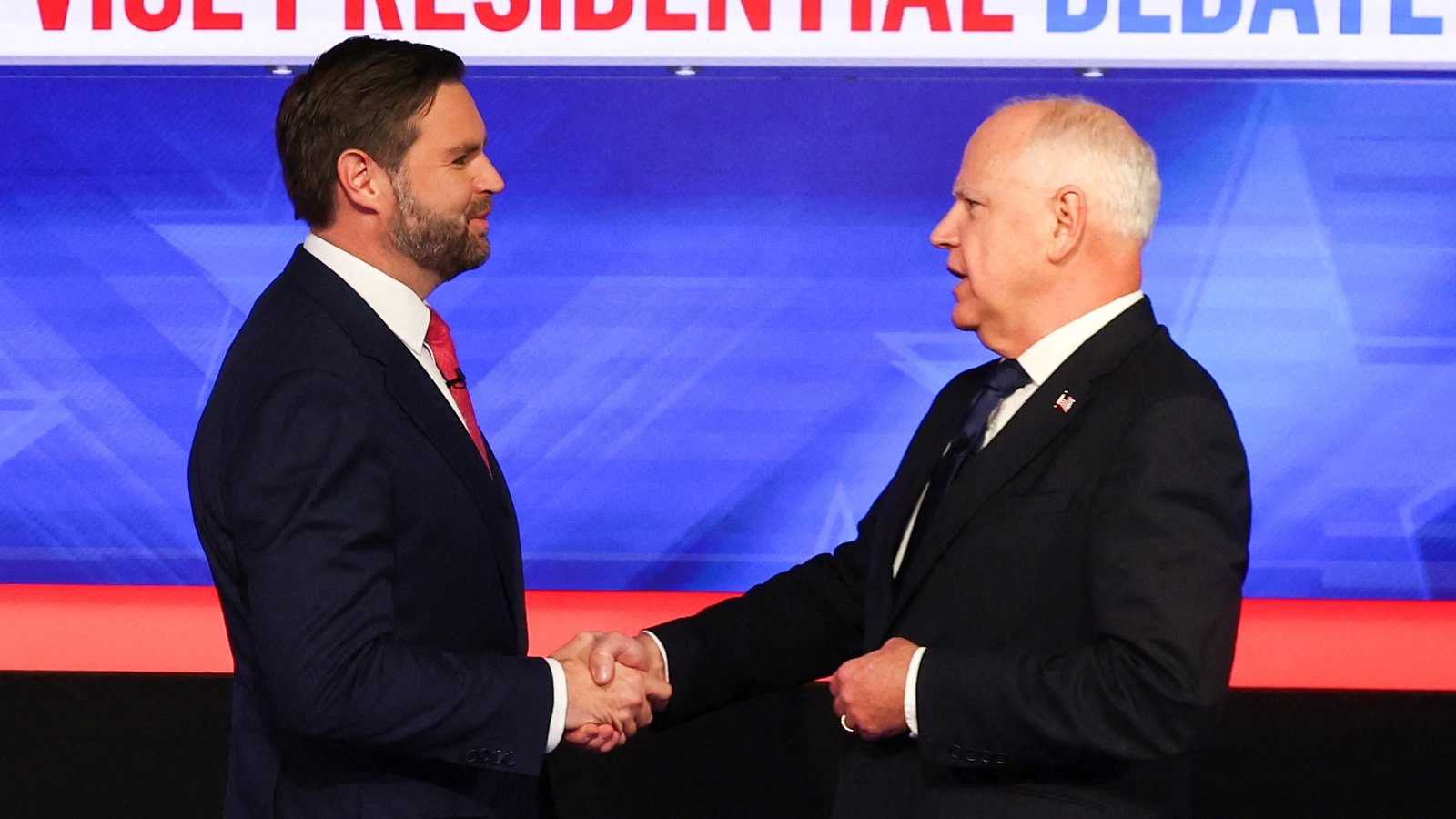Surprisingly cordial.
A vice-presidential debate built up as two attack dogs going at each other turned out to be something not seen for a while at the top level of US politics – a rather old fashioned affair in which two politicians talked about policy in a polite and civil way, didn’t insult one another, and proved the old adage true – that it is possible to disagree without becoming disagreeable.
When the debate ended the two men shook hands, touched each other on the upper arm, and carried on chatting while their wives joined them on stage – all four of them shaking hands and being polite and respectful.
Nobody was deemed weird or a communist. It was so normal it was startling.
They still managed to highlight the differences between each other – and more importantly, between their respective bosses. And if you were scoring it as a debating competition – where what is said counts for less than how it is said – then Vance would probably have come out as the winner.
He was more fluent, sharper in attack and rebuttal: Walz was nervous, a bit flappy, jumping from one half formed idea to another. And he failed to land any real blows on Vance.
He also failed to do what his boss Kamala Harris had done to Donald Trump: bait him into exposing his less endearing policies or ways of speaking abut them.
Notably he failed to clearly finger Vance as the origin of the Cat and Dog eating claims about Haitian migrants in the town of Springfield Ohio.
But the really surprising takeaway from the Tim Walz-JD Vance debate was just how much they agreed with one another on some big policy issues. Notably childcare, where both agreed that in a wealthy country like America a lot more could be done about ensuring all workers could get paid maternity leave.
We need your consent to load this comcast-player contentWe use comcast-player to manage extra content that can set cookies on your device and collect data about your activity. Please review their details and accept them to load the content.Manage Preferences
But Walz may have been the victim of the plainspoken nice-guy-next-door routine that has endeared him to audiences at rallies and those who have seen him in scripted or semi-scripted videos.
He said in advance that he was not a great debater, and he was true to his word, letting Vance off the hook several times by failing to come back at him (the microphones were open at all times, unlike the Presidential debate).
This meant Vance could evade tough questions on abortion (he denied his previously stated support for a national abortion ban) and was able to sound reasonable by saying his party had to work really hard to win back peoples trust on abortion, IVF and other issues related to women’s health.
The self-deprecation seemed to surprise Walz, who could do little more than nod in agreement.
There was something old fashioned about this debate, in the sense that one felt if left to their own devices these two might just be able to make a go of the old constitutional idea of American politics – that the only way to get any business done is to seek out cross-party agreement and make compromises in order to make laws.
The divisive politics of Trump is so dominant now that being reminded of politics the way the founding fathers intended it to be was almost refreshing.
Almost refreshing, but not quite.
Because we all know these two will not be left to their own devices – not by their bosses, Trump and Harris – and not by their party activists.
And besides, based on what JD Vance has said at campaign events, he may not be that amenable to finding common ground.

The two candidates mostly stuck to their designated roles, of being the surrogates for Trump and Harris. That’s why they spent far, far more time attacking either Trump or Harris than they did each other.
Because they know that vice-presidential debates don’t matter to the public: they are voting for a President, not a vice-president. Defending their party standard bearer was the most important task, and they both stuck to it.
The other big task was not to foul up. The last thing either candidate wanted was to say or do something that would divert the limelight from their boss, the actual presidential candidate.
Failure would mean either of the vice-presidential candidates would dominate the headlines for the next week, while the campaign team spent energy and resources cleaning up the mess. With 34 campaigning days left in an incredibly tight contest, neither side can afford such a diversion of resources.
But Vance and Walz can rest easy. Its a case of job done, with no fear either of them will dominate the headlines for the next week. A mid-ranking story that lasts one 24-hour news cycle would suit both sides.
True, Donald Trump did try to rain on the aisle-crossing feel good empathy vibes of this debate by posting on X “JD crushed it: Walz was a low IQ disaster – very much like Kamala”.
It was of a piece with his pre-debate assessment of Walz as “a moron – a real moron: I don’t know why she picked him”.
Some are wondering if Trump will be content to let Vance have the final word in this debate cycle, or will he be tempted to agree (against the strong advice of his campaign staff) to another debate with Harris.
On the basis of this debate, he can probably pass on the opportunity and concentrate on the campaign proper for the remaining 34 days.
They say vice-presidential debates don’t move the needle in Presidential contests. This one certainly won’t.
And both Walz and Vance will be quite happy about that.

